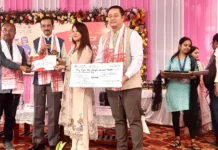RONO HILLS, 19 Feb: The Anthropology department of the Rajiv Gandhi University (RGU) celebrated the World Anthropology Day on Wednesday.
Speaking on the topic ‘Anthropology and Public Interface,’ prof. M.C. Arun Kumar, HoD of Anthropology in Manipur University highlighted the uniqueness of anthropology as a discipline in the study of individuals in a group.
“Anthropologists are required to collaborate with their field informants to bring out the insider’s perspective-based, while elaborating on the significance of collaborative ethnography. Anthropologists are required to critically examine the social problems like suicide, drug use, etc. with an intention to transmit their findings to the affected communities for their benefits,” Kumar said.
He also spoke about the problematic nature of trans-boundary studies focusing on borderland peoples like Mishmi and Tangsas as an example.
RGU vice chancellor prof. S.K Nayak spoke about the rich tradition of anthropology and the need for young anthropology scholars to contribute significantly to the discipline.
RGU’s AITS director prof. Jumyir Basar stressed on the need of understanding the difficulties encountered by anthropologists during the fieldwork especially, in the context of Arunachal Pradesh.
“Historical consideration is required during the fieldwork to document the cultural traditions properly,” Basar said.
Dean of the Faculty of Social Sciences at RGU, prof. Sarah Hilaly spoke on the intersections of anthropology and history especially, in the context of North-East India and Arunachal.
RGU registrar Dr. N.T Rikam said “Arunachal Pradesh is a “paradise for anthropologists” considering its rich ethnic and cultural diversity.
RGU’s head of Anthropology department Dr. Radhe Amung talked about the importance of fieldwork in anthropology discipline and the ethical dilemmas being faced by the anthropologists during fieldwork in the state.
Programme coordinator Dr. Dhritiman Sarma from Anthropology department also spoke.


